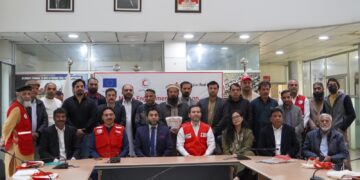KARACHI – Pakistan Yarn Merchants Association(PYMA), has urged the Federal Minister for Finance and Revenue Shaukat Tarin to eliminate the discrimination between Industrial and commercial importers and provide equal opportunities for business, also requested to impose same taxes on both so that business activities could be restored, which is already facing severe economic crisis caused by the COVID-19 pandemic.
In an appeal to Minister for Finance and Revenue Shaukat Tarin, Hanif Lakhany, Vice President, Federation of Pakistan Chambers of Commerce & Industry (FPCCI) & Senior Vice Chairman Pakistan Yarn Merchants Association(PYMA), Farhan Ashrafi, Vice Chairman PYMA & convener FPCCI’s Central Standing Committee on Yarn Trading, have stated that commercial importers of synthetic yarns essentially cater to the needs of SME sectors, the knitters and weavers in the SMEs sector don’t have access to the bank credits and exclusively rely on commercial importers to meet their needs of raw materials.
PYMA office-bearer said “Commercial importers also facilitate the SME sector by providing credit. Unfortunately, our current taxation policy penalises commercial importers of raw materials, which results in higher costs and subsequently the SME sector has to bear the additional cost on account of discriminatory tax regime”, they added.
Hanif Lakhany, Farhan Ashrafi pointed out that the industrial importers of synthetic yarn are subjected to withholding tax at import stage at 1pc versus 2pc for commercial importers. Furthermore, Industrial importers pay no value addition sales tax at import stage whereas commercial importers are subjected to a 3pc value addition sales tax. The extra cost incurred by commercial importers is passed on to SMEs rendering them uncompetitive
They further said that SMEs sector due to its very nature suffers from many disadvantages because of their small size and lack of access to formal credit. The government can be to ensure that they get their raw materials at competitive prices
“Another contentious issue is the further tax in case of sales to unregistered buyer. The conventional wisdom would have us believe that more unregistered buyers will register to avoid paying further tax at 3pc and that the tax base will be expanded. The ground realities are very different and this policy is incentivizing fake invoices causing revenue leakages”, they opined.
Hanif Lakhany, Farhan Ashrafi strongly urged the government to eliminate the discrimination industrial & commercial importers of raw materials and apply uniform tax rates to both. Government must seriously review these flawed policies and come up with a solution to minimize possibilities of abuse by making it easier for taxpayers to comply.



















